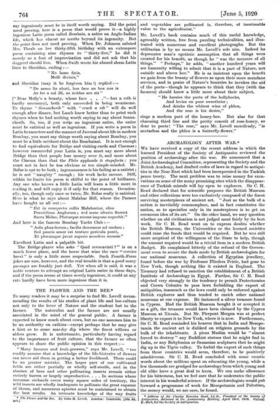THE FLOWER AND THE BEE.* To many readers it may
be a surprise to find Mr. Lovell recom- mending the results of his studies of plant life and bee-culture not only to the lover of Nature and the student but to the farmer. The naturalist and the farmer are not usually associated in the mind of the general public. A farmer is expected to know much about cows, but no one assumes him to be an authority on catkins—except perhaps that he may give a hint as to some marshy dip where the finest willows or alders grow. It is unfortunate, particularly having regard to the importance of fruit culture, that the farmer so often appears to share the public opinion in this respect :-
" Many farmers and fruit-growers," says Mr. Lovell, " too readily assume that a knowledge of the life-histories of flowers can never aid them in getting a better livelihood. There could be no greater mistake. The larger part of our cultivated fields are either partially or wholly self-sterile, and in the absence of bees and other pollinating insects remain either entirely barren or largely unproductive. . . . In sections where immense orchards cover many square miles of territory, the wild insects are wholly inadequate to pollinate the great expanse of bloom, and numerous apiaries must be maintained to obtain the best results. An intimate knowledge of the way fruits • The Plower and the Bee. By John H. Lovell. London : Vendable. DO& Od.
mt.] and vegetables are pollinated is, therefore, of inestimable value to the agriculturist."
Mr. Lovell's book contains much of this useful knowledge, agreeably written, free from puzzling technicalities, and illus- trated with numerous and excellent photographs. But the utilitarian is by no means Mr. Lovell's sole aim. Indeed he deprecates man's egotistic assumption that all things were created for his benefit, as though he " was the measure of all things." " Perhaps," he adds, " another hundred years will see humanity willing to admit that it is a part of Nature, not outside and above her." He is as insistent upon the benefit we gain from the beauty of flowers as upon their more mundane services, and in praise of Nature's bounties he invokes the aid of the poets—though he appears to think that they (with the farmers) should know a little more about their subject
" He harries the ports of the hollyhocks,
And levies on poor sweetbrier ; And drinks the whitest wine of phlox, And the rose is his desire,"
sings a modern poet of the honey-bee. But alas for that charming third line and the pretty conceit of rose-honey, so dear to poets ! "The rose," says Mr. Lovell mercilessly, "is nectarless and the phlox is a butterfly-flower."


































 Previous page
Previous page